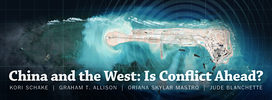I would like to emphasize a few points based on the responses of Graham Allison and Jude Blanchette to Kori Schake’s lead essay.
First, as Allison points out, one of the central questions in the debate concerns what factors account for the peaceful transition from British to American predominance without war. Allison’s own work shows that such a peaceful transition only occurs in 25% of relevant cases. While this is an important inquiry for IR theorists, it is not the most relevant question for U.S. strategists. A transition of power from the United States to China would still constitute a failure, peaceful or not. The real question is as follows: under what conditions has the dominant power managed to maintain its position in the face of a rising power short of war? Or perhaps more pessimistically, if there is to be war, how can the United States ensure it wins as quickly as possible and at the lowest possible cost?
Second, we continue to make assumptions about China that are too simplistic and naïve based on the fact that it is an autocracy. Few people argue now that China will liberalize, but most see the extension of Xi Jinping’s tenure as a sign of system decay and weakness. While I agreed with Jude Blanchette’s conclusion that China is backsliding toward greater authoritarianism, I am less sure that this will hurt China on the world stage. We assume that liberalism is a better way to accumulate, exercise, and maintain power. It could be, but scholars and strategists need to lend a more critical eye when we make direct connections between China’s autocratic nature and predictions about China’s future. What if Xi extending power directs China through a vulnerable time, allowing for the implementation of critical military reforms necessary to make China a global power? What if instead of thinking of the domestic public as against the regime, we recognize it is more complicated than that, with many supporting at least China’s international agenda? In other words, I think Allison prioritizes geostrategic issues over domestic political factors too much, but Schake does not do so enough. China’s domestic political situation will drive their foreign policy behavior, but perhaps not in ways we expect.
Lastly, what to do about it? There is a general agreement among the authors that the United States should do more to maintain its position, but there are a number of unsolved issues. Does this necessarily involve directly contesting China’s rise? If so, how exactly should the United States do so given the international complications Allison lays out? Given the U.S. domestic political challenges, do we even have the resources and will necessary to consider a more proactive strategy? And is the United States willing to risk war to do so? These are politically sensitive issues – and therefore not discussed as openly and in detail as they perhaps should be.

